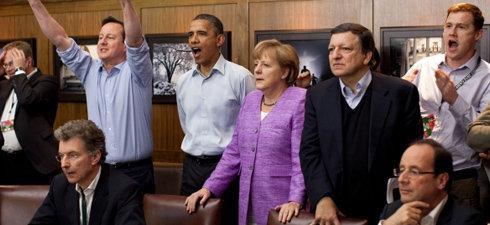For the increasing number of people who have been accusing the Germans of smugness and complacency over the eurozone crisis, the Champions League final defeat of Bayern Munich by the Russian protectorate known as Chelsea FC will have provided a certain amount of ... well, the only word is Schadenfreude.
At the start of the match in Munich's Allianz Arena, a vast banner was unfurled, reading (and I translate) "Our City, Our Stadium, Our Cup". The tribune of the Bavarians, the Süddeutsche Zeitung, had before the game published the forecast of no fewer than 56 "experts" and, to its great satisfaction, all 56 had declared Bayern's victory to be little short of a certainty.
I confess that after the result I couldn't resist logging on to the Süddeutsche website, to read its reporter's despatch from the ballroom of Munich's Postpalast hotel, where 800 guests had been invited to celebrate Bayern's inevitable victory: "There is a terrible atmosphere in the festively decorated room... stunned faces everywhere." Ah well, it's only a game. Not so the struggle to keep the euro going, in which Germany is being accused of playing against the rest of the currency's members, when it ought to realise that everyone is on the same team.
At the G8 heads of government meeting in Washington, the German Chancellor Angela Merkel was, in effect, put on the naughty seat, with all the other leaders, from Obama down, taking turns to tell her to agree to launch so-called eurobonds, effectively using the German taxpayers to guarantee the vast debts of the single-currency zone.
Leave aside that the German government has been told by its own constitutional court that it could never do such a thing, it would in any case be completely unacceptable to the country's own public – as it would be to any sovereign people in a similar position. If anything Merkel has already gone far beyond what her electorate would have wanted in terms of guarantees. As Guido Westerwelle, the country's minister for Foreign Affairs, told an American audience earlier this year: "The German parliament has approved financial guarantees of more than €200bn [through the European Stability Mechanism]. Translated to the size of the US economy this would be the equivalent of far more than one trillion US dollars in guarantees by the US Treasury. Can you imagine members of Congress approving such a sum to help out non-Americans?"
From Munich
Germany most indebted Euro club country
At the informal May 23 summit of eurozone heads of state and governments, Angela Merkel will be more isolated than ever, writes the Süddeutsche Zeitung —
With her austerity policy and recipes for reducing debt, she is rousing more and more countries against her. In the lead-up to the Brussels summit, there is no doubt that the world expects greater efforts from Germany [...]. France’s new President François Hollande is supposed to find a path that moves away from the policy of austerity. On the verge of the extraordinary summit in Brussels, Merkel appears to be standing alone against the rest of the world. On the one side, grimly determined thriftiness; on the other, the committed advocates of growth. But appearances are deceptive. Despite the sparkling revenues coming in, the government is piling up debts [...] Germany is the most indebted country in the Euro club.
Was this article useful? If so we are delighted!
It is freely available because we believe that the right to free and independent information is essential for democracy. But this right is not guaranteed forever, and independence comes at a cost. We need your support in order to continue publishing independent, multilingual news for all Europeans.
Discover our subscription offers and their exclusive benefits and become a member of our community now!












